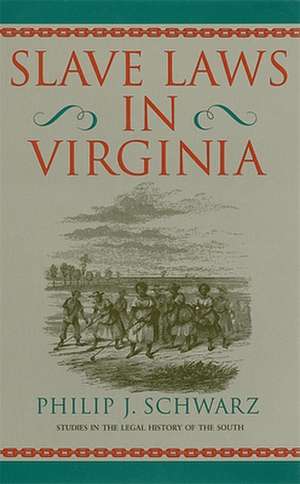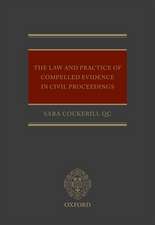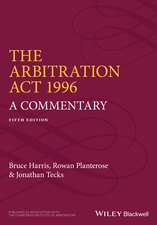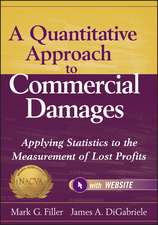Slave Laws in Virginia: Studies in the Legal History of the South
Autor Philip J. Schwarzen Limba Engleză Paperback – 30 apr 2010
Instead of relying on a static view of these two centuries, the author focuses on the diverse and changing ways that lawmakers and law enforcers responded to slaves' behavior and to whites' perceptions of and assumptions about that behavior.
Din seria Studies in the Legal History of the South
- 18%
 Preț: 703.96 lei
Preț: 703.96 lei -
 Preț: 251.36 lei
Preț: 251.36 lei -
 Preț: 273.47 lei
Preț: 273.47 lei -
 Preț: 244.41 lei
Preț: 244.41 lei -
 Preț: 269.65 lei
Preț: 269.65 lei -
 Preț: 442.54 lei
Preț: 442.54 lei - 18%
 Preț: 697.98 lei
Preț: 697.98 lei -
 Preț: 215.45 lei
Preț: 215.45 lei -
 Preț: 221.33 lei
Preț: 221.33 lei -
 Preț: 219.04 lei
Preț: 219.04 lei -
 Preț: 272.10 lei
Preț: 272.10 lei -
 Preț: 248.66 lei
Preț: 248.66 lei -
 Preț: 253.66 lei
Preț: 253.66 lei -
 Preț: 249.43 lei
Preț: 249.43 lei -
 Preț: 220.19 lei
Preț: 220.19 lei -
 Preț: 270.41 lei
Preț: 270.41 lei -
 Preț: 193.40 lei
Preț: 193.40 lei -
 Preț: 255.18 lei
Preț: 255.18 lei -
 Preț: 352.86 lei
Preț: 352.86 lei -
 Preț: 377.79 lei
Preț: 377.79 lei -
 Preț: 266.34 lei
Preț: 266.34 lei -
 Preț: 222.10 lei
Preț: 222.10 lei -
 Preț: 244.23 lei
Preț: 244.23 lei - 27%
 Preț: 681.61 lei
Preț: 681.61 lei -
 Preț: 333.75 lei
Preț: 333.75 lei -
 Preț: 276.85 lei
Preț: 276.85 lei
Preț: 220.34 lei
Nou
Puncte Express: 331
Preț estimativ în valută:
42.16€ • 44.14$ • 34.89£
42.16€ • 44.14$ • 34.89£
Carte tipărită la comandă
Livrare economică 05-19 aprilie
Preluare comenzi: 021 569.72.76
Specificații
ISBN-13: 9780820335162
ISBN-10: 0820335169
Pagini: 272
Dimensiuni: 140 x 216 x 15 mm
Greutate: 0.35 kg
Editura: University of Georgia Press
Seria Studies in the Legal History of the South
ISBN-10: 0820335169
Pagini: 272
Dimensiuni: 140 x 216 x 15 mm
Greutate: 0.35 kg
Editura: University of Georgia Press
Seria Studies in the Legal History of the South
Notă biografică
PHILIP J. SCHWARZ is a professor of history emeritus at Virginia Commonwealth University. He is the author of numerous books including Migrants against Slavery: Virginians and the Nation and Twice Condemned: Slaves and the Criminal Laws of Virginia, 1705-1865.
Textul de pe ultima copertă
The five essays in Slave Laws in Virginia explore the ever-changing relationship between a major slave society and the laws that guided it. The topics covered are diverse: One essay, on the African judicial background of African American slaves, helps us understand the perspectives on law, crime, and punishment that slaves may have brought with them from Africa. Another essay focuses on Thomas Jefferson's relationship with the laws of slavery to show how they constrained slaveowners as well as bondpeople. Other topics covered in the collection include the capital punishment of slaves, nineteenth-century penal transportation of slaves from Virginia as related to the interstate slave trade and the changing market for slaves, and Virginia's experience with its own fugitive slave laws. Through the history of one large extended family of ex-slaves, Philip J. Schwarz's conclusion examines how the law shaped the interaction between former slaves and masters after emancipation. These discussions of the contexts of legal choices concerning slavery, as well as of decisions made about slavery in light of the law, illuminate a wide range of developments in the law of bondage, all of which affected the lives of both slaves and slaveowners. Yet the most important aspect of these legal developments, says Schwarz, was the interaction among various people - more and less powerful slaveowners, more and less assertive slaves, outsiders such as Northern abolitionists, and even African lawmakers - that resulted in both unwritten customary law and statutes.















